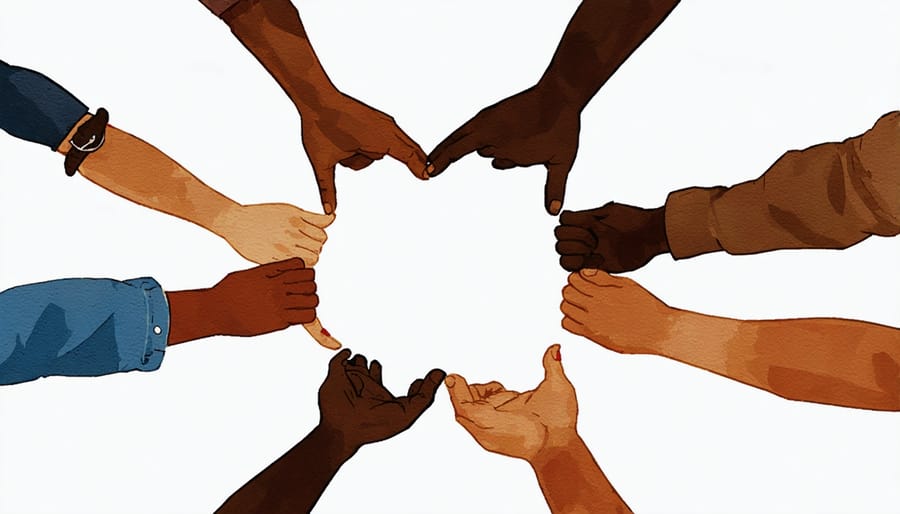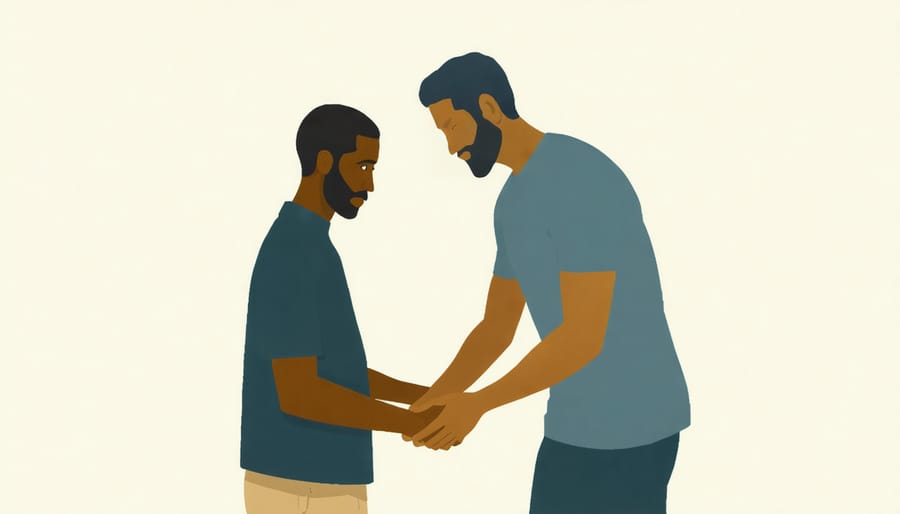In a world fractured by racism and division, the Bible offers a powerful message of racial reconciliation through the gospel. The Scriptures reveal God’s heart for diversity, unity, and justice, providing a solid foundation for Christians to address the sin of racism and pursue healing in their communities. From Genesis to Revelation, we see a consistent thread of God’s love for all people, regardless of ethnicity or background, and His desire for His followers to reflect that love in their relationships with one another. As we delve into the biblical narratives, teachings, and examples related to racial reconciliation, may we be inspired and equipped to become agents of change, boldly proclaiming the hope and healing found in Christ alone.
We Are All Created in God’s Image

Unity in Diversity
God’s intentional design for humanity is beautifully diverse, reflecting His creativity and love. From the beginning, God created people of all races, ethnicities, and cultures in His image (Genesis 1:27). The Bible celebrates this diversity, highlighting how God’s plan of redemption includes people from every nation, tribe, and tongue (Revelation 7:9). Despite our differences, we are all one in Christ Jesus (Galatians 3:28). God desires unity among His diverse children, not uniformity. He calls us to embrace our unique identities while recognizing our shared bond in Christ. As believers, we must actively pursue unity by valuing, respecting, and learning from one another. When we come together in love and unity, we demonstrate the power of the gospel to break down barriers and heal divisions. Ultimately, our unity in diversity brings glory to God and points others to the reconciling work of Christ.
Breaking Down Dividing Walls
The Bible offers powerful examples of how Christ breaks down dividing walls between people groups. In Ephesians 2:14-16, Paul declares that Jesus “has made the two groups one and has destroyed the barrier, the dividing wall of hostility” between Jews and Gentiles. Through His death on the cross, Christ abolished the law that separated these groups, creating “one new humanity” in Himself. This passage highlights God’s heart for reconciliation and unity among all people. Similarly, Galatians 3:28 affirms that “there is neither Jew nor Gentile, neither slave nor free, nor is there male and female, for you are all one in Christ Jesus.” In God’s Kingdom, earthly divisions lose their power as we find our ultimate identity in Christ. As followers of Jesus, we are called to embody this unity and actively work to break down the walls that divide us.
Love Your Neighbor as Yourself
The Good Samaritan
The parable of the Good Samaritan (Luke 10:25-37) offers a powerful lesson on racial reconciliation. In this story, Jesus challenges the prevailing prejudices of his time by portraying a Samaritan – a member of a despised ethnic group – as the hero who shows compassion to a Jewish man in need. This parable teaches us that true love transcends racial and cultural boundaries. It calls us to see the inherent dignity in every person, regardless of their background, and to actively seek opportunities to serve and care for those who are different from us. As Christians, we are called to follow the example of the Good Samaritan, breaking down walls of division and extending God’s love to all people. By embracing this mindset of compassion and unity, we can become agents of racial reconciliation in our communities, reflecting the heart of Christ to a world in need of healing and hope.

Overcoming Prejudice
Following Jesus means rejecting all forms of prejudice and racism. The Bible teaches that God created all people in His image (Genesis 1:27) and that Christ’s redemptive work is for all nations and ethnicities (Revelation 7:9). In Christ, there is no room for discrimination based on race, ethnicity, or social status (Galatians 3:28). Jesus himself broke down cultural barriers by interacting with people from various backgrounds, such as the Samaritan woman at the well (John 4:1-42). He also commanded his followers to love their neighbors as themselves (Mark 12:31) and to make disciples of all nations (Matthew 28:19-20). As Christians, we are called to follow Christ’s example by actively uniting across cultures, celebrating diversity, and standing against injustice. This requires humility, repentance, and a willingness to listen and learn from one another as we pursue reconciliation and unity in Christ.
Repentance, Forgiveness and Healing
Lament and Confession
Lament and confession are essential steps in the journey of racial reconciliation. As believers, we must humbly acknowledge the sin of racism and its devastating impact on individuals and communities. The Bible calls us to mourn with those who mourn (Romans 12:15) and to confess our sins to one another (James 5:16). By lamenting the pain caused by racism and confessing our own complicity in perpetuating it, we open our hearts to God’s transforming grace. This process involves honestly examining our thoughts, words, and actions, and repenting of any attitudes or behaviors that contribute to racial division. As we turn from the sin of racism and seek God’s forgiveness, we demonstrate our commitment to love and justice. Through lament and confession, we create space for healing, restoration, and the building of authentic relationships across racial lines, as we pursue the unity that Christ desires for His Church.
Forgiveness and Reconciliation
Forgiveness is a central theme in the Bible, and it plays a crucial role in racial reconciliation. Jesus taught his followers to forgive others as God has forgiven them (Matthew 6:14-15), and this principle extends to all relationships, including those affected by racial prejudice. The parable of the unmerciful servant (Matthew 18:21-35) emphasizes the importance of forgiving others, as we have been forgiven an even greater debt by God. Moreover, the Bible calls believers to pursue peace and reconciliation with others (Romans 12:18, 2 Corinthians 5:18-20). By extending forgiveness and seeking reconciliation, Christians can demonstrate the transformative power of God’s love and grace in their relationships. This process may involve acknowledging past wrongs, repenting of prejudiced attitudes, and actively working to restore broken relationships. As believers embrace forgiveness and reconciliation, they can experience healing, unity, and a powerful witness to the world.
The Ministry of Reconciliation
Christians are called to be ambassadors of Christ, agents of reconciliation in a broken world (2 Corinthians 5:18-20). As believers, we have experienced the transformative power of God’s love and grace, which tears down the dividing walls of hostility (Ephesians 2:14). With this knowledge, we are compelled to extend the same love and grace to others, bridging the gaps created by racial prejudice and injustice. By embodying the reconciling work of Christ, we can be catalysts for healing, understanding, and unity in our communities and beyond, reflecting the beautiful diversity of God’s kingdom.

A Picture of the Kingdom
Every Tribe and Tongue
The book of Revelation paints a breathtaking picture of the ultimate destiny of God’s people: a vast, multiethnic congregation worshipping before the throne of the Lamb. In Revelation 7:9, John describes this scene: “After this I looked, and behold, a great multitude that no one could number, from every nation, from all tribes and peoples and languages, standing before the throne and before the Lamb, clothed in white robes, with palm branches in their hands.” This vision reminds us that racial reconciliation is not merely a social or political goal but a central aspect of God’s redemptive plan. As Christians, we are called to embody this unity in diversity, celebrating the beautiful tapestry of cultures and ethnicities woven together by Christ’s love. By pursuing racial reconciliation in our churches and communities, we offer a foretaste of the glorious worship that awaits us in eternity.
Pentecost and the Early Church
The early church, born at Pentecost, embodied the transformative power of the Holy Spirit in fostering unity amidst diversity. As the Spirit descended upon believers from various backgrounds (Acts 2:1-4), linguistic and cultural barriers were transcended, foreshadowing the gospel’s global reach. This outpouring empowered the church to embrace people from all nations, tribes, and tongues, reflecting God’s heart for reconciliation. The early believers shared their possessions and cared for one another’s needs (Acts 2:44-45), demonstrating love that surpassed societal divisions. As they witnessed this radical unity, others were drawn to the faith, deepening faith in Christ. The early church’s example challenges us to allow the Spirit to break down walls of prejudice and create communities where all are valued, loved, and empowered to serve as one body in Christ.
The Bible’s powerful message of racial reconciliation calls us to be agents of change in our own lives and communities. As followers of Christ, we have a responsibility to actively pursue unity, love, and understanding across racial and cultural boundaries. This journey begins with humble self-reflection, repentance for any prejudice or bias, and a willingness to listen and learn from others. By embracing the diversity of God’s creation and valuing each person as an image-bearer of Christ, we can build bridges of reconciliation and healing. Let us commit to being peacemakers, advocating for justice, and extending compassion to all. As we allow the Holy Spirit to transform our hearts and minds, we can become a powerful witness of God’s love and grace in a divided world. Together, let us work towards a future where every tribe, tongue, and nation is united in worshiping our Savior and King.
